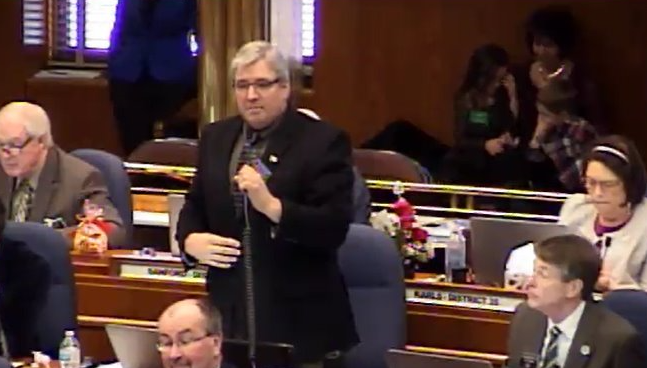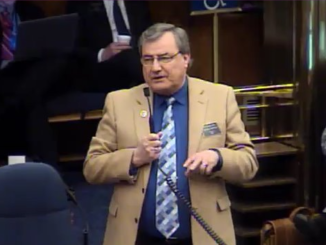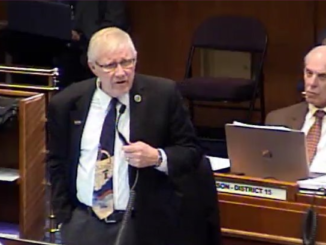
Rep. Sebastian Ertelt (R – District 26) wanted to add another free market option to the state’s nutrition industry. His proposed legislation — House Bill 1482 — was actually very simple. It provided an exception for those who aren’t “a licensed registered dietitian or licensed nutritionist” so that they could offer “nutrition recommendations, guidance, counseling, assessment, or education” to those willing to receive it. This lands short of licensed dieticians and nutritionists who, according to Rep. Ertelt, lay claim to the ability to treat or cure disease.
An example of those who might have benefitted from the bill were described as “fitness-type facilities” by Rep. Todd Porter (R – District 34), who carried the bill to the floor yesterday and urged his colleagues to vote red. In Porter’s view, it’s necessary for the state to protect the public from these folks and that if they want to offer such services they should jump through the hoops to become licensed dieticians.
Rep. Jeff Hoverson’s (R – District 3) response to Rep. Porter’s floor speech was straight and to the point:
“With all due respect, when I’m listening to it, I’m thinking, ‘Did I just hear we want to regulate what people eat and not allow other people to— we don’t want to allow adults to have a discussion with somebody about what they want to eat?’ Or am I understanding this wrong?”
Rep. Hoverson’s assessment is pretty much what supporting the status quo does. After all, with few exceptions, a person can’t legally give dietic advice for pay without a license. Even if they both are mutually agreeable to entering into that contractual situation.
Rep. Ertelt explained that HB 1482 was really an informed consent bill. It provided a means whereby two adults could contract with one another for nutritional services. As part of that process, the individual providing the service would have been required to provide “the recipient of the individual’s services with a copy, either by written or electronic means, of the individual’s nutrition education and training, scope of practice, and code of ethics.” On top of the informed consent aspect of the legislation, those providing the service also would have had to carry liability insurance.
But just as we’ve come to expect from the legislative proceedings in Bismarck, the majority of lawmakers aren’t too interested in free markets. Much like the recent dental therapy bill, they prefer protectionism and nanny state regulations— all for the public good of course. As Rep. Ertelt correctly pointed out, “consumer protection” is often used as an excuse to keep new competition out of the market. In the end, that is exactly what happened. The bill was defeated 24-63.
One thing we learned from hearing debate on this bill is that there is a North Dakota Board of Dietic Practice— not that this is really surprising. The state seems to have a board for just about everything. But as Rep. Ertelt pointed out in his comments, it’s not that we can really point to society and say that the licensing and regulation of the industry has made for a healthier North Dakota. For example, he shared statistics that since 1995 the rates of diabetes has doubled from less than 5% of the population to nearly 10%. Obesity has increased from less than 20% to over 30%. In the words of Rep. Ertelt:
“If we’re to think that our dieticians, nutritionists, and others in the healthcare industry are doing such a bang-up job about protecting our consumers and helping to treat and cure disease in our state, I think you would find it a little alarming…”
It’s a great point. Not only should individuals be able to provide these types of services as a matter of right to contract — without the intervention of government — but allowing competition into the market may just result in a better product for consumers.
I think it’s also interesting to note the protectionism that took place on the part of the Board of Dietic Practice. As you can see in the North Dakota Century Code, the board is only required to meet twice a year— once to elect a chairperson and again in a regular meeting. Additional meetings are optional. But their own meeting minutes show that they met three times between January 26th and February 14th to discuss HB 1482 and to make plans to oppose it. I find that fascinating.
I also noticed the meetings were held via teleconference. Yet, state law requires that all meetings of the board be open to the public. How can a teleconference meeting be open to the public? But I digress.
Is it any wonder that we have the bureaucracy that we do, when adults aren’t even permitted to determine something as simple as who is and isn’t qualified to give them recommendations, guidance, counseling, assessment, or education in matters of nutrition? Instead, the state creates an entire regulatory apparatus in the name of protecting its citizens, only to have a board that can use their positions to lobby for keeping competition out.
Protectionism under the guise of protecting the public wins again.
Sources:
- https://www.legis.nd.gov/assembly/66-2019/documents/19-1035-04000.pdf
- https://theminutemanblog.com/2019/02/12/house-rejects-logic-in-favor-of-protectionism-kills-dental-therapy-bill/
- http://www.ndbodp.com/
- https://www.legis.nd.gov/cencode/t43c44.pdf#nameddest=43-44-01
- http://www.ndbodp.com/meetings.html





